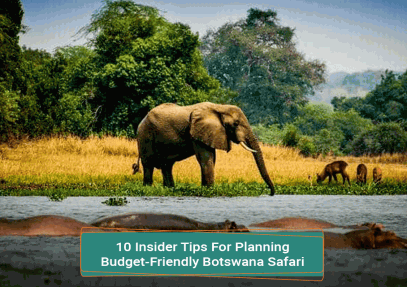
Get ready for an unforgettable African safari experience, where you can immerse yourself in the stunning African wilderness! An African safari gives you a chance to see the world’s most magnificent animals in their natural habitat and witness great wildlife spectacles, such as wildebeest migration between Tanzania’s Serengeti and Kenya’s Masai Mara. You can also go whale watching in South Africa, witness Zimbabwe’s Victoria Falls in all its raw glory, or experience Zanzibar’s culture and beaches, as well as a host of other incredible safari experiences across the continent.
When you’re ready to embark on your safari adventure, you need to give some thought about what to pack. The climate on the African continent can vary widely depending on the location and time of the year you are visiting. It’s important to do your research for the trip and pack accordingly.
In this safari guide, we’ll share a safari packing list that can guide you in preparing for your African safari adventure.
7 Things You Should Pack for Your African Safari
1. Clothing and Footwear
The ideal time to visit most African safari destinations, such as Tanzania and Kenya, is during the dry season (June-Oct) when the weather is warm. Pack lightweight and breathable clothing for safari and don’t forget for game drives you need wear appropriate neutral colours – sand, beige, brown etc. Avoid white, brightly coloured clothes and camouflage clothes. You should also pack a swimsuit and check whether you need a smart casual outfit for evening dinner. The sun will be out so packing a hat and sunglasses to get the much-needed shade is a highly recommended.
If you are planning to explore the bush on foot, you should take along a comfortable and worn in pair of hiking boots or closed-toe shoes. It can be cold in the early mornings or evenings during the winter months of June, July and August, so you should pack additional layers, such as a fleece plus a beanie for cold winter mornings. If you are visiting an African destination during the rainy season, take a good rain jacket, as the weather can be unpredictable during these times and there often big downpours.
Make sure you check what the weather will be like before you travel. Pack light and layer up. Many safari lodges/camps offer a laundry service (not always underwear) so if you are staying somewhere for more than one night you can get some items washed. In a nutshell, clothing and footwear options for safari should be chosen with comfort and weather in mind.
2. Personal Hygiene and Toiletries
When packing for an African safari, it’s necessary to pack personal hygiene essentials and toiletries. Many African safari lodges and camps will provide basic amenities such as soap and shampoo, but it’s always a good idea to pack your own.
You should take essentials such as toothpaste, toothbrush, deodorant, and wet wipes in a small travel-sized toiletry kit. Insect repellent is necessary to ward off any bugs, especially if you are planning to camp outside at night or go on walking safaris in the bush. Taking a basic first aid kit, which should include essentials such as bandages, antiseptics, and pain relievers will help you treat minor ailments. Don’t forget to take sunscreen, it is especially necessary as you will be exposed on the morning and afternoon game drives.
3. Medicines
One of the most important things to pack for your African safari is any necessary medication or medical supplies you take regularly. This should include prescription medication for chronic medical conditions or allergies.
Note that malaria is a concern in many African countries, so be sure to discuss anti-malaria medication and preventive measures with your doctor before travelling. You should also check with your doctor or travel clinic about all the necessary inoculations before visiting Africa for a safari.
Additionally, it’s a good idea to pack medication for diarrhoea and upset stomach, as changes in the diet and water can often cause digestive issues.
4. Electronic Devices
Don’t forget your electronic devices, spare batteries, memory cards, travel adapters and chargers. Being able to charge in your game drive vehicle is also handy, so find out beforehand if you can.
A phone is a must-have for communication and having access to information on the go. However, keep in mind that some locations might not have cellular service. Check with your provider if they allow roaming whilst you are travelling. When on game drives make sure that your phones are set to silent – you wouldn’t want to ruin an intimate viewing experience with a ringing phone!
Also useful is a small flashlight or headtorch for navigating your safari camp or tent at night.
5. Camera, Video and Binoculars
A camera, video camera, or binoculars are all great bits of equipment that can help to enhance your safari experience.
Consider investing in a good-quality camera that you can take stunning wildlife pictures with. Having a good zoom lens helps you get close to the action, all from a safe distance. You can use the video camera to record a travel diary that you can upload to your social media or save as digital memories. Don’t forget to pack extra batteries and memory cards for your camera. You can also bring a tripod, or beanbag to use on the vehicle, to stabilise your camera in order to get the perfect shots!
With good-quality binoculars, you will be able to get a close-up look at the African wildlife, in particular birds. Often safari vehicles have binoculars on board which you can use, but it’s also really helpful to have your own pair too. Being on a safari can be a dusty, bumpy affair, where you and your equipment are exposed to the elements so storing them in a waterproof/dustproof case, is a good idea to help protect your equipment.
Do you want to learn how to take perfect pictures of African wildlife and landscapes? Read our guide, 10 Hacks For Taking Amazing Photos While On An African Safari.
6. Miscellaneous Items
In addition to the essential safari gear we have already mentioned, there are a few miscellaneous items that you should consider packing to enhance your African safari experience.
- Daypack to carry a water bottle and spare clothes
- Local currency for tips and small purchases
- Something to read – book or e-book reader for lazy afternoon after game drives
- Notebook/diary to write down what you see on game drives
- Travel docs – passports/IDs (with copies), travel itinerary, insurance details.
7. Luggage
It is key to understand this before you start packing – pack light and simple so you can travel with ease. Your main bag should be able pack 20-25 kg and be robust enough to hold up under rough handling – preferably a soft-sided ripstop canvas duffle bag that you can easily load in safari vehicles. You should also pack a small backpack or shoulder bag for carrying essentials such as insect repellent and sunscreen on game drives.
If you are a keen photographer then your camera bag should have space for all your other travel essentials like your electronics, passports, and travel documents.
8. Things You Shouldn’t Pack For Your African Safari
- Camouflage clothing
- Bright-coloured clothing
- Strong smelling perfumes or colognes
- Expensive jewellery
- Any types of drugs that are not prescription
- Don’t use one-use plastic bags
Conclusion
Our packing list for African safari features all the essential items that you’ll need to have an enjoyable experience on your safari. To summarise, you need to pack light, focusing on the essentials such as clothing, footwear, personal hygiene, and toiletries. Next, you need to pack items such as insect repellent sprays, medications, sunglasses, hats, sunscreen, and a small daypack for game viewing or walking safaris.
If this is your first safari, for more information also refer to our guide: Safari Gear: 15 Must-Have Items to Pack for Your First Safari.
Leave a Reply
Your email address will not be published. Required fields are marked *













No Comments